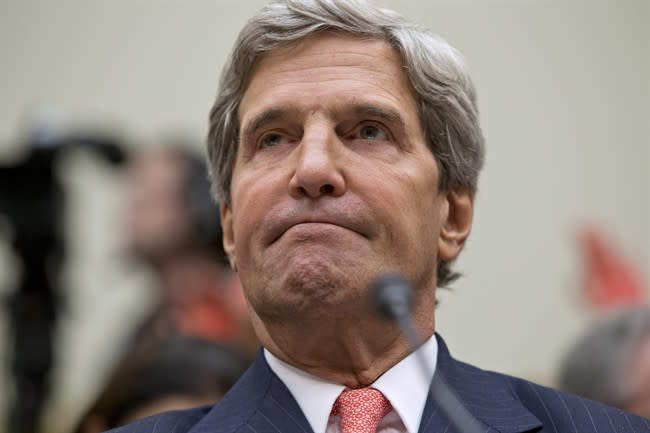 David vs. David
David vs. DavidAttack on Syria: We must act to support the abused people of Syria

Most Canadians probably believe that intervening militarily in Syria would be a major error, despite overwhelming evidence that Bashar al Assad’s regime has used lethal gas against civilians on many occasions over the past two years. Hundreds of men, women and 426 children were horrifically murdered by chemicals in a Damascus suburb on Aug. 21.
As Alisar Iram, a Syrian living in Europe, says:
Assad unleashed warplanes, helicopter gunships, ballistic missiles, cluster bombs, white phosphorous bombs, TNT-filled barrel bombs and surface-to-surface missiles, including Scud missiles ... against his people, ending with chemical warfare, yet the world watched indifferently… This is a war against children, women and the vulnerable. This is a naked, savage, ruthless war against those who are weaker...
The U.S.-U.K. alliance has already suffered with the loss of a government motion in the British House of Commons to approve military strikes. Stephen Harper has also indicated that Canada will not take part in any military mission. France to date is the only nation in Europe to say it will support an attack on Syria.
Former U.K. Prime Minister Tony Blair noted on August 27:
(After) Iraq and Afghanistan, I understand every impulse to stay clear of the turmoil … But contemplate the future consequence of inaction and shudder: Syria mired in carnage between the brutality of Assad and various affiliates of al-Qaida … Egypt in chaos, with the West, however unfairly, looking as if it is giving succour to those who would turn it into a Sunni version of Iran. Iran still — despite its new president — a theocratic dictatorship, with a nuclear bomb … This is a nightmare scenario but it is not far-fetched.
Obama has insisted that any American action will be "tailored", "limited" and aimed only at discouraging the Syrian government from using chemical weapons again. He has decided against “direct military engagement … I have no interest in any kind of open-ended conflict in Syria”.
Obama also decided that he would first seek the support of Congress. The leaders of the House and Senate say the votes on military action will take place during the week of Sept. 9. The top two concerns on the Hill include an explicit ban on committing U.S. troops in Syria and setting an expiration date for the authorization.
Secretary of State John Kerry stresses that the U.S. has obtained new evidence inside Syria confirming that al-Assad's regime used sarin, a strong nerve agent, against civilians in the August 21 attack. Kerry thinks this will help the White House build support on Capitol Hill and among allies in Europe and the Middle East to take military action aimed at degrading Mr. Assad's ability to conduct chemical warfare.
Those of us who favour a limited intervention by air have an obligation to urge the U.S., France, and any other government participating to be fully realistic about the implications of attacking Assad’s military facilities.
The loss of civilian lives from bombing of military targets in Syria must be avoided at all costs. The most scrupulous care must be used at all times to avoid fatal mistakes made in Afghanistan, Bosnia, Iraq, Kosovo and elsewhere. If there is any possibility that a civilian might be hit, other targets must be chosen.
The Responsibility to Protect doctrine (R2P), proposed first in Canada, was adopted unanimously by the U.N. General Assembly in 2005 to prevent rogue governments from murdering their own citizens. There must be limits on barbaric excesses of national sovereignty in the 21st century. If it cannot be successfully applied to punish Assad in the present circumstances, R2P is a sterile addition to international law.
In the U.N. Security Council, Russia and China, whose governments oppose any limits on what regimes can do to its population, will use their permanent vetoes to block any military intervention in Syria, yet some attempt to obtain Council passage of a resolution should still be made. Advocates can stress that if Assad and his allies, including the mullahs in Iran, Hezbollah in Lebanon and Vladimir Putin in Russia, prevail in Syria, the use of chemicals against Sunni civilians will escalate.
Syrian-Canadian Louay Sake, who is assisting the Free Syrian Army led by the staunchly secular General Salem Iris, noted earlier, “The Russian government is very serious about winning the war. The U.S. and other countries want to talk and to have meetings in Geneva…” Putin wants from Assad to keep in Syria the only strategic military base Russia now has outside the former Soviet Union.
[ Previous DvsD: It's impossible to expect peace in Egypt through military means ]
In the short term, those intervening in Syria should institute a general or limited no-fly zone over the country. It would protect some civilian lives from bombs and possibly more government aircraft-delivered gas — at least in areas held by rebels. It might also restore balance in the civil war, thereby improving the prospects for holding a meaningful peace conference soon.
Canada and other like-minded governments should contribute additional humanitarian assistance to the estimated two million refugees (including a million children) already in Turkey, Jordan, Lebanon and Iraq (Canada has already subscribed $81 million towards Syrian relief). We must all do our share, too, in accepting refugees from Syria and Egypt.
In short, despite the many difficulties, Canada and the international community should in a thoughtful and measured way support abused peoples Syria and elsewhere in the Middle East.
David Kilgour is co-chair of the Canadian Friends of a Democratic Iran and a director of the Washington-based Council for a Community of Democracies (CCD). He is a former MP for both the Conservative and Liberal Parties in the south-east region of Edmonton and has also served as the Secretary of State for Latin America and Africa, Secretary of State for Asia-Pacific and Deputy Speaker of the House.



